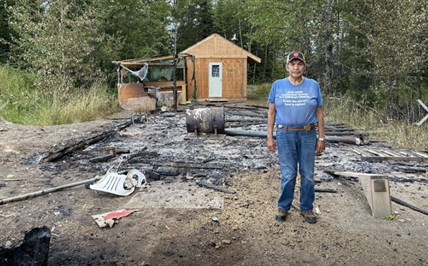Elevate your local knowledge
Sign up for the iNFOnews newsletter today!
Sign up for the iNFOnews newsletter today!
Selecting your primary region ensures you get the stories that matter to you first.

Months after the Wet’suwet’en ended their blockade of a forest service road near Houston, B.C. the burning down of a chief’s cabin is being called racist and linked to a long history of Canadians burning homes of first nations people in the area.
The cabin was in an area on the Morice Forest Service Road where some Wet’suwet’en had protested the construction of the Coastal Gaslink natural gas pipeline and had blocked the road.
The area is passed daily by construction crews and patrolled regularly by RCMP, which reported the fire on Saturday, Aug. 15, according to the Wet’suwet’en Access Point on Gidimt’en Territory Facebook Page.
“This just reminds me of the first time that white people came,” Fred Tom, Chief Gisday’wa of the Gidimt’en Clan, said in the post. “They kicked our families out of their territory and then they burnt all their huts and everything else, and put them on their so-called reserves."
The dispute over construction of the pipeline sparked protests and other blockades across the country.
READ MORE: Wet'suwet'en chiefs, ministers reach draft arrangement in pipeline dispute
The post outlines a history of hostility towards the Wet’suwet’en.
“It’s absolutely racist. I think it’s white supremacists in the local communities,” the post states. “This hate crime is the latest in a long series of arsons undertaken by settlers, industries, and state agents against Wet’suwet’en homesites that have occurred since contact.”
It also points out that the fire happened two days after the local newspaper, Houston Today, ran a front page story headlined: Wet’suwet’en checkpoint material remains alongside forest service road.
It said the paper ran pictures of the cabin site and “falsely claimed that his structures had been ‘left behind’ with ‘no apparent recent use.’
The online version of that story shows a photo of some signs and tarps, but not the cabin.
“The material left behind from the standoff, at the 27km mark of the forest service road, consists of several lean-to structures, tarpaulins, firewood, chairs, traffic cones and signs,” the article reads. “Photos show no apparent recent use.”
To contact a reporter for this story, email Rob Munro or call 250-808-0143 or email the editor. You can also submitphotos, videos or news tips to the newsroom and be entered to win a monthly prize draw.
We welcome your comments and opinions on our stories but play nice. We won't censor or delete comments unless they contain off-topic statements or links, unnecessary vulgarity, false facts, spam or obviously fake profiles. If you have any concerns about what you see in comments, email the editor in the link above.
News from © iNFOnews.ca, . All rights reserved.
This material may not be published, broadcast, rewritten or redistributed.

Want to share your thoughts, add context, or connect with others in your community?
You must be logged in to post a comment.